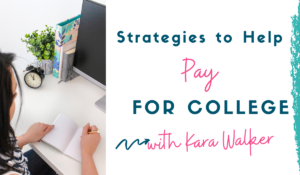0:00:01.5: Planning for college in your sophomore year is exciting and can feel overwhelming, there are times when you think it’s way too early to look at anything, and there are other times when you think that you are so far behind, but the good news is you are right where you’re supposed to be. Today we’re going to talk through exactly what that college timeline for high school sophomores looks like.
Alright, so we are so excited to have you here. Today is also our 20th episode. I am loving the time that we are able to spend together, this is such a fun and exciting thing, and thank you all so much for listening to our episodes, and for supporting our podcast. We have over 200 downloads at this point, and if this podcast has been helpful for you, I would absolutely love it if you will leave a review, and share the podcast with your friends, with family, and with others that are going through the same thing.
Don’t forget about our new free Facebook group that is open, and you can come to join us to have a community of other people who are going through the same thing, to have honest conversations, to be able to search, and get some free training.
0:01:23.1: We’re going to have different tools, tips, and tricks that we will share with you as well as being able to have a podcast vault. In the group, we will have a link to a spreadsheet where you can find all of the episodes that we have quickly and easily just by searching.
So today, we are continuing with our series where we’re looking at that college timeline, so what does that college timeline look like for high school students, and today we’re specifically talking about our sophomores. So one of the things that I want to do, we’re going to talk through different things for the fall, we’re going to talk through different parts for the winter, I don’t have this as broken up as we do for our juniors and seniors, because there’s more time, and you don’t necessarily have to have it broken down by seasons.
With that being said, for our sophomores, there is one particular piece that you’re going to be looking at in the fall. That is taking the PSAT, which takes place in October.
0:02:24.0: It’s typically mid-October. Many schools administer that SAT, the PSAT is great practice for the SAT. Some schools also will offer the ACT plan assessment that can be taken as a precursor to the ACT.
The PSAT is typically more frequently given, and either one of those tests is a great way to measure where you stand right now. For some students, depending on the course that they’re in for math, some of the math can feel a little bit overwhelming and some of them might not score as high as what they had expected that they would.
When students are taking those assessments, the more math classes that they take as high school students, their Algebra 1, their geometry, some students are even looking into Algebra 2 in their sophomore year or higher, depending on when they started taking their math classes, that math component is going to get a whole lot easier.
The other thing that you can do when you take the PSAT, when you get your scores back for most tests, they’re going to tell you what your strengths were, they’re going to tell you what your areas for growth were or some of those weaknesses, so that you know where to focus your time, you know exactly what you can and should be doing in order to raise your scores for the next time.
0:03:49S2: The other thing that you can do with the PSAT and the SAT College Board is the company that makes those assessments, they actually have a partnership with Khan Academy.
Khan Academy has, a lot of different videos that will help students walk through different topics that they need as far as support. This could be support for classes or just learning how to complete a different problem for math, English, science, they have all the subjects available. The other thing that you can do with Khan Academy and College Board is you can sync your two accounts and they will actually tell you exactly what you need to study in order to increase your scores.
For our juniors and seniors, College Board has some different scholarship opportunities, and with that, you actually are able to be entered in a drawing for a scholarship. If you look at the College Board Opportunity Scholarship you can find details and students can be entered in a drawing just by studying and using those partnered accounts with College Board and Khan Academy.
The other thing that we want you to do in the sophomore year is to make sure that you continue to give your best effort in all of your classes as grades impact GPA.
GPA is a factor in looking at college applications, looking at merit-based scholarships, depending on the state, that you live in states might also give scholarship money for your GPA, for your rank.
0:05:25.6: For your test scores in South Carolina, which is where I live, there are three different tiers of scholarships that look at the specifics of your GPA, your rank, and those test scores. The higher the GPA, the higher the class rank, the higher those test scores are the more merit scholarship money that students are able to earn.
When you are in your sophomore year, some students know exactly what they want to do and they feel that they know a specific career is a perfect thing. Students think that this career is what I’m going to do for the rest of their life.
As a high school counselor, there have been countless times that I had students who would come into my office as upperclassmen and say, you know what, this is what I said I wanted to do last year, or two years ago, and I have completely changed my mind and I want nothing to do with that ever again. Students can absolutely change their minds! It is ok! We don’t expect our students at the age of 14, 15, 16, 17, and some of them at 18, to know exactly what they want to do for the rest of your life.
0:06:31.3: Sophomore year is a really good time for students to take career interest inventories, to spend some time researching different careers, and being able to find out what may be the best fit for them.
For students that work with me for coaching, we go into more detail on a lot of those tools and tips and tricks, helping you do some more research to identify interests.
Some students will complete an internship, they might do some job shadow days, or they will do interviews with different professionals.
Some of that changed when the pandemic hit, in 2020. A lot of things are opening back up now, and there are some amazing opportunities that are available.
We’ve seen some trends and some ability to have different virtual opportunities, so depending on where you are, if you live far away from big cities that have potential majors that you might be interested in, it might not be an option to go do a job shadow day, so there are a lot of different things that you can look into.
0:07:45.4: You also want to make sure as you’re looking at careers that you are thinking about your personal values, what values does the student have, do they want to have their time evenings and weekends free, or they… Do they want to be able to travel with their work, do they want to be able to say more at home, are they someone who is super active and so they wouldn’t do well with sitting at a desk for a good chunk of their day, or is that something that they’re more introverted or… And so that they would enjoy that time where they’re more sitting at the computer or sitting at a desk, it depends on the student, and not that any one of those things means that you have to have a particular job, but thinking about, Okay, who am I… What do I enjoy? And what’s going to make me happy? Some students that I’ve worked with have said, If I have to sit at a desk for the entire day, I’m not going to be able to handle it. Other students, they would much rather have that.
0:08:44.6: Looking at salary, so what kind of lifestyle do I want to have?
0:08:48.1: What kind of salary are these potential careers making, how many hours of work do you typically have to have in that career… If you tell me you want to work 20 hours a week and you want to make a million dollars and have a pretty significant income and be able to do all the things that you want, you’re really going to have to do some exploring and some digging to figure out, okay, what kinds of careers can help me with that, is this a realistic expectation or is this something where I really need to take a deep dive and say, Okay, let’s think about what I might actually be able to do what I can make and what’s realistic, and again, that’s something that we talk a whole lot more with the students that I individually coach, and having some of those honest and in-depth conversations if a student is interested in going into the military or being part of a branch of the military, it’s definitely worth talking to a recruiter about the different branches, about the different policies and procedures that go into that student in listing and joining the military.
0:10:00.4 S1: Is that something that they’re going to go into immediately after high school, is that something where they want to go to college first and then join, and what are the different benefits or the pros and cons of each of those things.
0:10:10.8 S2: I would definitely encourage students in their sophomore year to continue to be involved with different clubs, volunteer work, and different activities, if career interests have changed from what they thought they wanted in eighth and ninth grade, this is a good time to see if there are different clubs or activities that they could be involved in. That experience hat can give you an idea of whether the career is something you really may want or if that area may not be the direction you want to go.
0:10:35.8 S1: You also can see if there are times when students can be a leader. If there’s something that you’re incredibly passionate about, You need to be able to find something that students enjoy, that is going to be able to also speak to their unique story and who they are.
We want to have our students looking at that four-year plan of classes you may want to take based on career interests at that time. As sophomores and juniors, students should review the plan to see if they need to adjust it.
0:11:15: If those prospective colleges have changed, are there different requirements that I need to make sure that I’ve taken those classes, are completed these activities to meet the minimum requirements for admission for application at those schools, you need to keep in mind that your school might have a timeline for schedule changes, and the schedule changes may mean that you don’t get to do that until your junior year, so the high school that I worked at and work in, we have very specific.
Even our state, South Carolina has very specific timelines and deadlines for when students can make changes to their schedules. You can’t just decide mid-semester I’ve decided I don’t like this class and I don’t want to take it anymore.
When you can’t change classes, you need to adjust the four-year plan recognizing your interests have changed and you can request different classes in the future.
You want to talk with your students about paying for college. This can be a challenging conversation, I actually have a podcast episode that will link in the show notes that discusses specifically how to have those conversations and what those look like.
0:12:29.1 Think about college savings plans, review financial aid options, the colleges that your student is looking at, you want to see, are we able to stack scholarships or is it something where if we have scholarship money that we are bringing in, the college is going to say, Okay, then you don’t have that merit money that we would give you, these are just all things that you need to know about as you’re having some of those conversations.
0:12:52.2 S1: Your high schools that your students attend might have a designated time of the year where you get to have an individual meeting with your high school counselor. You want to continue to develop that relationship so that you get to know them and they get to know your student. Discuss the rigor of courses your student is taking, college prep, honors, AP, IB, or dual enrollment. You want your student to be challenged, but you also don’t want it to be going overboard to a point where it is detrimental to their school experience and their mental health.
Sophomore year is a really good time to start thinking about college tours, whether that be virtual or face-to-face. In this series of those timelines, we have two podcast episodes that will be linked where we talk through how to make the most out of your college visits, we talked about what questions do you ask when you are having discussions with a college admissions representative or a student who’s giving a tour?
You will want to find out, does your college look at demonstrated interest. Demonstrated interest is something that the colleges can monitor to see if you are truly interested and have learned about the school or if you applied but may not be as interested as others.
The colleges can see how long you’ve been on a website, did you read an email, Did you click through the link in an email to go to the website and spend time, and they can see how long you were on there.
0:14:25.9: There are a lot of different things that those schools can track as they are looking at what students are doing, and it’s important to make sure that you know if the colleges have demonstrated interest and if so, that you make sure that you are on top of that.
An additional task for our sophomores is to look at ACT and SAT prep options. So we talked about the PLAN, we talked about the PSAT, there are different free activities that you can do to study for tests, and then there also are different paid programs, and you have to figure out what’s going to be the best for your student.
There are self-driven programs and those where you can work with a tutor. Is your student somebody who can sign into a website and start looking at everything on their own? Do they have the self-discipline to study those pieces on their own? Would they study better in a group of people where they can bounce ideas off of each other? Or do they need individual support?
There are a lot of different options and there are a lot of different price ranges within those options. Have conversations with your student to find out about their individual needs with studying.
0:15:35.6: I am not an expert on all things ACT and SAT prep. With that being said, at my current school, we do not recommend that students take the ACT or SAT until they are at least enrolled in Algebra 2. A lot of the math content that is going to be in that course is something that will be assessed for the ACT and SAT.
We’ve previously discussed, and will continue to discuss, having kind of a personal profile where you are looking at all of the activities, honors awards, volunteer opportunities, make sure that that profile is updated with what students are doing in their sophomore year.
My other recommendation is that you think about what makes your student unique and what compliments have they received over the years from friends, from teachers, family, other people that know your coaches that know your student. Include those on your personal profile as well.
0:16:39: So that as you are going in and you’re creating a brag sheet or, Here are the things that make me unique, here are the things why I should be accepted into your school, when you’re looking at resumes, when you are looking at asking for letters of recommendation, all of those pieces that personal profile is when you update it regularly, you’re going to make sure that you’re not missing anything.
Your student’s sophomore year is an incredibly exciting time!
It can also be a time where you make sure that you are on top of things, when you break the tasks down into little pieces, it can make the future much more manageable.
Don’t forget about our new Facebook group, it’s the Confused to College Ready podcast. The link is
facebook.com/groups/confusedtocollegeready.
We also would love for you to leave a review on our podcast, this is an incredible way for other people to find the information for it to be something that is helpful for you, it’s more than likely to be helpful for somebody else.
If you have any questions or concerns, you are also welcome to reach out to me at admin@confusedtoready.com.









